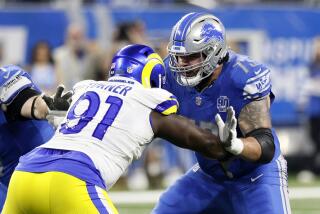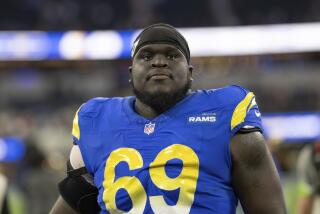Mortgaging Future Paid Off for Buffalo : Bills: Polian gambled that acquiring linebacker Bennett would justify the loss of draft picks. He was right.
- Share via
Four years later, it isn’t hard to find the winner in the three-team Eric Dickerson trade.
The Rams are 3-8. Dickerson is 31, suspended and out of the 1-10 Colts’ plans.
But the Buffalo Bills, the silent partner in October of 1987, are gearing up for a second consecutive Super Bowl run, with blitzing linebacker Cornelius Bennett, the player they acquired in the deal, in a starring role.
The Bills were heavily criticized for giving up two No. 1 picks, a No. 2 and Greg Bell for the rights to Bennett, who had refused to sign a rookie contract with the Colts. Bennett probably will play in his fourth consecutive Pro Bowl after this season.
“It got us over the hump,” Bill General Manager Bill Polian says of the trade.
Does Polian think he won the biggest three-team gamble in recent NFL history?
“Oh, no,” he says. “I’ve never viewed it from any perspective other than ours.
“Our feeling was this: If Cornelius turned out to be what we were sure he would be, and if he was the catalyst for our team defensively we hoped he would be, then the choices we were giving up would have been low choices in relatively weak drafts.
“And that was our concern. If he failed to live up to what we felt, then the choices we were giving up were going to be high choices and then we would clearly have been the loser.”
Using the kind of long-range planning that eluded the Rams and the Colts, Polian pinned the Bills’ hopes on Bennett.
“We thought that basically nobody coming out in future drafts would have the impact of a Bennett,” Polian says. “Turned out to be wrong, Derrick Thomas came out afterwards, but there weren’t many who could approximate what we thought Cornelius could do for us.”
Polian says he spent three days working up the courage to pull the trigger on the deal.
“You swallow hard when you give up that much of what accepted wisdom tells you is the future,” he says.
Colt General Manager Jim Irsay, while acknowledging that all hasn’t been glorious for his team since Dickerson led them to a surprise division title in the year of the trade, says he considers the deal a success.
” . . . One thing you have to consider about the Indianapolis Colts-Baltimore Colts is our team’s state the last 10 years before the deal was made,” Irsay says.
“We hadn’t had a Monday night football game in 10 years--since ‘78--hadn’t been to the playoffs or even had a winning season since ‘77, and then you go back afterwards from 1987 through 1990 and see we had the sixth-best record in the AFC--even a better record than the Raiders.
“We were a team that in the past was something like 12-36 and afterwards was 33-31. The tremendous boost for us was very beneficial.”
And, he said, there might still be other benefits.
“We’re happy from the things we’ve gained from it,” he said. “We think the legacy of the trade is still being developed.
“It was an exciting trade to be part of, something I’ll never forget. It was an incredible time. Something special for our town, our state and for our franchise. Before, it was: ‘(Owner) Bob Irsay won’t pay,’ and this was one stigma that was erased completely. People were flabbergasted with it.”
Irsay does not agree that the Bills were the clear winners. Too simplistic, he says.
“It’s so easy to try to find big, symbolic victories to show how it was done,” Irsay says. “People love to do that. But it’s really all the little victories or all the little losses that make the difference.
“I don’t really see that where we are today . . . or the Rams, and Buffalo, is a direct result of the trade. It’s somewhat of a fallacy to continuously point directly to it.”
More to Read
Go beyond the scoreboard
Get the latest on L.A.'s teams in the daily Sports Report newsletter.
You may occasionally receive promotional content from the Los Angeles Times.










